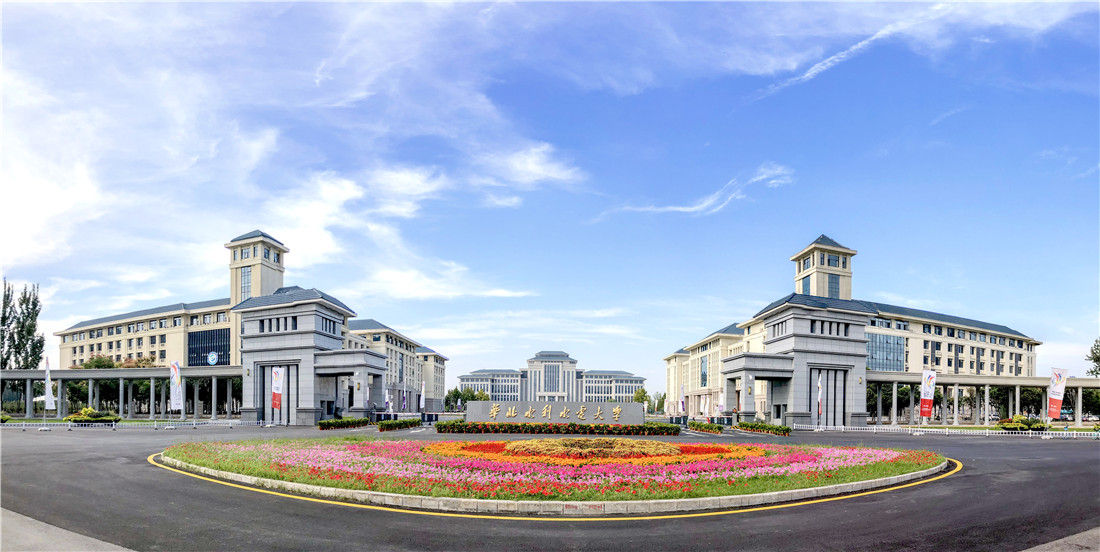North China University of Water Resources and Electric Power
华北水利水电大学

华北水利水电大学位于河南省郑州市,是水利部与河南省共建高校,是河南省重点支持建设的骨干高校,是“金砖国家网络大学”中方高校牵头单位。学校起源自1951年创建于北京的中央人民政府水利部水利学校,1990年迁至河南省郑州市办学,2013年更名为华北水利水电大学。
华北水利水电大学建校以来,为国家培养了近30万名高级专业技术人才和管理人才,包括“雨果奖”获得者刘慈欣,组建“中国蓝天救援队”的安少华等各领域杰出校友,彰显了学校“下得去,吃得苦,留得住,用得上,干得好”的人才培养特色。学校是以水利电力为特色,工科为主干,理、工、管、农、经、文、法、艺等多学科协调发展的大学,学校设有水利学院、电力学院等24个教学单位,水文化研究中心等98个研究机构。现有66个全日制本科专业,3个博士学位授权一级学科,19个硕士学位授权一级学科,10个专业硕士学位类别,其中有8个工程硕士领域。学校现有教职工2300人,具有正高级职称教师230人,具有博士学位教师680人;学校现有学生32000余人。
华北水利水电大学近年来相继与法国尼斯大学、英国提赛德大学、韩国启明大学、俄罗斯乌拉尔联邦大学等世界高水平大学签署合作协议,开展中外合作办学。积极融入金砖国家高等教育交流合作体系,成为“金砖国家网络大学”水资源与污染治理、能源两个领域的牵头高校。与俄罗斯乌拉尔联邦大学设立了“金砖国家网络大学·金砖国家大学联盟水工程与能源研究中心”,与俄罗斯圣彼得堡国立交通大学联合设立了中俄高铁研究中心,与韩国仁荷大学共同设立了物流工程研究中心。金砖国家网络大学体系下第一个合作办学机构-华北水利水电大学乌拉尔学院获教育部批准,并实现正式招生;成为河南省教育对外开放的重大突破性成果。与砂拉越科技大学联办的孔子学院正式获批,并在此基础上设立了学校首个境外办学机构-—华禹学院,标志着我校输出优质教育资源开展境外办学实现了零的突破,“开放活校”结出新硕果。
North China University of Water Resources and Electric Power located in Zhengzhou, Henan Province (hereinafter referred to as “NCWU”). NCWU is a university jointly established by the Ministry of Water Resources and Henan Province, it is one of the major universities intensively supported by Henan Province and the leading institution of Chinese universities in the BRICS Network University. NCWU originated from Water Conservancy School of the Ministry of Water Resources of the Central People’s Government, which was established in Beijing in 1951,it was moved to Zhengzhou, Henan Province in 1990,and renamed North China University of Water Resources and Electric Power in 2013.
Since its establishment, NCWU has cultivated nearly 300,000 senior professional and technical personnel and management talents for the country, including Liu Cixin (winner of the “Hugo Award”), and An Shaohua (founder of the “China Blue Sky Rescue Team”), which has highlighted NCWU’s talent cultivation characteristics of being “Humble, Hardy, Reliable, Practical and Capable”. NCWU is a university characterized by water conservancy and electric power, with engineering as its mainstay, and coordinated development of science, engineering, management, agriculture, economics, literature, law and art. NCWU has 24 teaching units including School of Water Conservancy and School of Electric Power, and 98 research institutions including the Yellow River Science Research Institute and the Water Culture Research Center. There are 66 full-time undergraduate majors, 3 doctoral degree-granting first-level disciplines, 19 master’s degree-granting first-level disciplines, and 10 professional master’s degree programs, including 8 engineering master’s programs. NCWU has 2,300 faculty members, 230 teachers with senior professional titles, and 680 teachers with doctoral degrees. There are more than 32,000 full-time undergraduates, master’s students, doctoral students and foreign students.
In recent years, NCWU has signed cooperation agreements with University of Nice Sophia Antipolis in France, Teesside University in the UK, Keimyung University in Korea, Ural Federal University in Russia and so on, to carry out Sino-foreign cooperation in school running. NCWU has actively integrated into the BRICS higher education exchange and cooperation system, and become the leading university in the field of water resources and pollution control and the field of energy in the BRICS Network University. It has established the “Water Engineering and Energy Research Center of BRICS Network University and BRICS University Alliance” with Ural Federal University, the Sino-Russian High-speed Railway Research Center with St. Petersburg State Transport University, and the Logistics Engineering Research Center with Inha University in Korea. NCWU-Ural Institute, the first cooperative schooling institution under the BRICS Network University system, has been approved by the Ministry of Education and officially begun to enroll students. It became a major breakthrough achievement in the opening up of education in Henan Province. The Confucius Institute jointly constructed by NCWU and University College of Technology Sarawak, Malaysia was approved in 2019, based on which NCWU successively established Hua Yu Institute, the first overseas schooling project of NCWU, indicating that NCWU has fulfilled the zero breakthrough in overseas schooling. The strategy of “Activating NCWU by Opening-up” bears new fruits.


